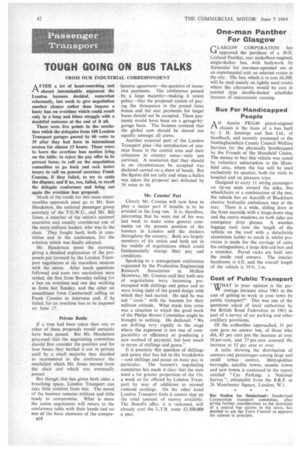TOUGH GOING ON BUS TALKS
Page 44

If you've noticed an error in this article please click here to report it so we can fix it.
FROM OUR INDUSTRIAL CORRESPONDENT
AFTER a lot of heart-searching and almost interminable argument the London busmen decided, somewhat reluctantly, last week to give negotiation another chance rather than impose a hasty ban on overtime which could result only in a long and bitter struggle with a doubtful outcome at the end of it all.
There were five points in the resolution which the delegates from 100 London Transport garages passed by 60 votes to 39 after they had been in intermittent session for almost 13 hours. These were: to leave the overtime ban motion lying on the table; to reject the pay offer in its present form; to call on the negotiation committee to go back and seek better terms; to call on general secretary Frank Cousins, if they failed, to try to settle the dispute; and if he, too, failed, to recall the delegate conference and bring out again the overtime ban proposal.
Much of the credit for this more statesmanlike approach must go to Mr. Sam Henderson, the national passenger group secretary of the T.G.W.U., and Mr. Bill Jones, a member of the union's national executive and usually considered one of the more militant leaders, who was in the chair. They fought hard, both in committee and in the conference, for the solution which was finally adopted.
Mr. Henderson spent the morning giving a detailed explanation of the proposals put forward by the London Transport negotiators at six marathon sessions with the union. After lunch questions followed and soon two resolutions were tabled, the first from Bromley calling for a ban on overtime and rest day working as from last Sunday, and the other an amendment from Camberwell calling on Frank Cousins to intervene and. if he failed, for an overtime ban to be imposed on June 17.
Private Battle
If a vote had been taken then one or other of these proposals would certainly have been passed. But Mr. Henderson procosed that the negotiating committee should first consider the position and for four hours they battled it out in private until by a small majority they decided to recommend to the conference the resolution which Mr. Jones moved from the chair and which was eventually passed.
But though this has given both sides a breathing space, London Transport can take little comfort from this. The mood of the busmen remains militant and little ready to compromise. What is more the union negotiators will return to the conference table with their hands tied on one of the basic elements of the compre al 0 hensivc agreement—the question of incentive payments. The conference passed by a large majority—making it union policy—that the proposed system of paying the threepence in the pound fares bonus and the seat payments for larger buses should not be accepted. These payments would have been on a garage-bygarage basis. The busmen contend that the global sum should be shared out equally amongst all crews.
Another essential part of the London Transport plan—the introduction of oneman buses in the central area and their extension in country areas—only just survived. A resolution that they should in no circumstances be accepted was declared carried on a show of hands. But the figures did not tally and when a ballot was taken the proposal was defeated by 56 votes to 44.
Mr. Cousins' Part
Clearly Mr. Cousins will now have to play a major part if trouble is to be avoided in the long run. It is, therefore, interesting that he went out of his way last week to make some general comments on the present position of the busmen in London and the dockers throughout the country. Both are largely members of his union and both are in the middle of negotiations which could fundamentally change their pay and conditions.
Speaking to a management conference organized by the Production Engineering Research Association at Melton Mowbray, Mr. Cousins said that both sets of negotiations were becoming preoccupied with shillings and pence and so were losing sight of the grand design with which they had started. He said he was not " cross " with the busmen for their militant attitude. What made him cross was a situation in which the good work of the Phelps Brown Committee might be brought to nothing. He declared: "We are drifting very rapidly to the stage where the argument is not one of comparability or efficiency or producing a new method of payment, but how much in terms of shillings and pence."
It is precisely this question of shillings and pence that has led to the breakdown —and shillings and pence on basic pay in particular. The busmen's negotiating committee has made it clear that the men want a far greater proportion of the 33s. a week so far offered by London Transport by way of additions to normal rostered earnings. On the other hand London Transport feels it cannot step up the total amount of money available. The Board's offer, it is reckoned, will already cost the L.T.B. some £3,500,000 a year.












































































































































































